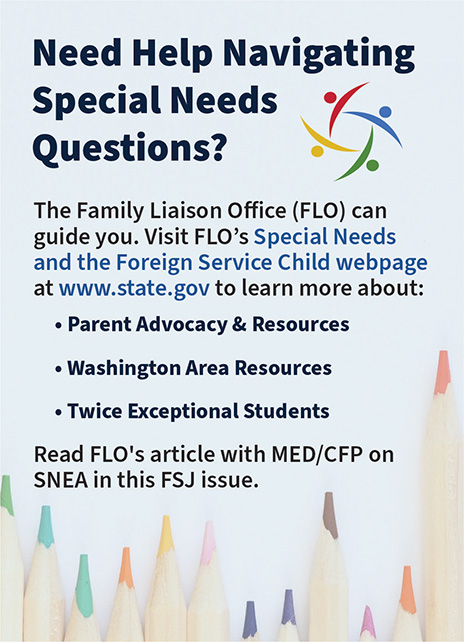Supporting Special Needs Families Abroad
Special needs families have a lot on their plate. Learning to connect with them will help the whole Foreign Service community thrive.
BY KAREM R. ENSLEY

istockphoto.com/wavebreakmedia
Parents of children with special needs have an especially bumpy path when trying to find their next job. When bidding for a post, they have to jump through hoops to get medical clearances for their children, find a school that can provide the services the child needs, apply for extra funding to cover these costly services that would otherwise be free in the United States, and so on. In some instances, they may find themselves moving into a society that views their child as “less than,” or they may even feel that they are an unwelcome addition to the U.S. embassy community.
These families have a lot on their plate. They have no family support close at hand, and most are still trying to figure out the best way to understand and help their child. Raising a special needs child is an ongoing process of discovery, regardless of where you live. The types of difficulties that each child must navigate range greatly—a speech impediment, an autism diagnosis, medical device needs, physical disabilities, inattentiveness, emotional struggles—and every child with special needs is different. Even if they have the same diagnosis, their needs, their personality and their interests can be worlds apart, just like any other child.
Chances are there is a family going through this at your post right now. Many of us want to help and connect, but do not know how. Below are some thoughts and observations from Foreign Service parents of special needs kids that might help us better appreciate their journey. With a little understanding, we might be able to connect and become an ally to our fellow officers—enabling them, ourselves and our community to thrive together as we carry out our vital mission.
1. Please keep inviting us to social events. We might not always say yes, but we still want to be included. Being parents of special needs kids can be a lonely journey. Without immediate family and other special education parents to rely on, or relate to, they can feel very isolated when reaching a new post. Having a sense of community and a support system are among the most critical assets a family with a special needs child can have. They desire deeply to be plugged into their broader community of fellow parents, but must ask for a measure of patience.
For example, sometimes it is just not possible to get out of the house for an event. Everyone might be excited to go, all dressed and ready, but something might trigger a behavior in their child, and by the time everyone calms down, the event is half over. Sometimes, they can’t arrange childcare; in some cases, any prospective sitter must have special qualifications or training. When trying to chat with other parents, they may be continuously interrupted because they cannot leave their children, who are needing parental guidance and support for social interactions, unattended.
Nonetheless, extending social invitations is a powerful signal to parents of special needs children that they are truly part of a community that genuinely wants to understand their situation and is there to support them.
Extending social invitations is a powerful signal to parents of special needs children that they are truly part of a community
2. We appreciate your help. It is tough knowing how to help a parent who you see might be struggling because you might not want to intrude or be rude. However, people can always be helpful in the smallest ways. The most useful assistance is very specific, like offering to hold their bag or watch one kid while the other is taken to the bathroom; or, on a higher level, offering to take the other siblings out for the day, babysit or cook meals.
“How can I help you?” is a great question to ask because it offers presence and a willingness to help right away. More vague questions and comments like “Let me know if you need help” or “I don’t know how you do it” have a connotation of separation or exclusion and do not translate to real help.
Genuine empathy is greatly appreciated as these families navigate their series of daily hurdles. Combining compassion with a little help can make a world of difference.
3. We’d love you to teach your children about differences. Parents of special needs children harbor the hope that their child’s peers will see their child beyond the superficial profile of being “different,” and allow them the dignity of being seen and heard as a unique individual just as worthy as any other child in the room.
By talking to our kids about the differences among others, and how these attributes can be strengths that add to our community’s diversity, we can plant a seed of curiosity that might make our kids want to take the time to get to know their special needs peers. This will lead to comfortable questions when they see others with different ways of speaking, hearing aids or leg braces, a different face structure or different behavior patterns.
Most important, it can minimize the unfortunate pointing and staring, which leave the child with special needs feeling sad, uncomfortable and isolated. These parents don’t want us to pretend that there is no disability, but instead to see beyond it, and acknowledge their child’s own unique passions, qualities, strengths and skills. In time, having a better understanding of diversity in all its forms will lead to enriching social interactions for all children involved.
“How can I help you?” is a great question to ask because it offers presence and a willingness to help right away.
4. Our kids also want to be accepted and included. One of the most heartbreaking experiences for any parent is witnessing their child being excluded in a social setting. Some parents of special needs children endure this pain frequently. Often children with special needs don’t have the social or physical skills to jump in and play, interact and converse with others. Some children may need a little time to join the group, but this does not mean they do not want to be a part of it. Please keep giving them a chance and ask them to join again.
Some special needs children might get overwhelmed or tired while in a group, and they might need a break; but this doesn’t mean that they want to stop interacting altogether. Welcoming them after they have a break will allow them to keep having fun and keep practicing their skills. Including them in the choice of game or topic of conversation is another way to make sure they can take part in the activity.
When our kids learn how to include others, especially those with special needs, and develop the skills of empathy and understanding, it will be a meaningful and proud milestone in their own development, as well.

istockphoto.com/yacobchuk
5. Getting my child the help they need overseas is not easy. Parents with special needs kids often find themselves pushing boulders up hills to get their child the resources they need at post. Some parents struggle with medical services or gear that might not be readily available. Some even struggle with getting the right foods for their child at post, which is why you might see some strange DPO/Pouch orders; please be understanding that these items might be among the few foods a child is able to eat. Some schools around the world are great; but, unfortunately, most international schools do not offer the services (or the quality of services) and trained staff necessary to educate special needs children effectively.
If you are in a place of power—school board representative, member of a parent teacher organization, community liaison officer, regional security officer, management officer or parents of school children—please become allies of the families with special needs children. Our special needs community members need allies to start asking the officials at these schools—who benefit enormously from U.S. government dollars—the following direct questions: “Do you accept special needs students at your school?” And, if the answer is no, then the follow-up questions would be “Why not?” and “How do we change that?”
6. My child is not bad. One of the most commonly recurring comments that parents of special needs kids share with me is their desire for other parents to understand that their children are not “bad” children because they “misbehave.” They want you to know that they are working hard, usually with numerous specialists, to teach their child how to better control their body, their emotions and their impulsivity, as well as how to better cope with different noises, places and people.
If you see a child “misbehaving,” ask yourself if there might be a reason for the behavior other than bad parenting or not enough discipline. Instead of staring or rolling our eyes, a reassuring smile, a “How can I help you?” or at least carrying on as normal gives these families the social breathing space they need to attend to the occasional turbulence in a public setting.
Some children may need a little time to join the group, but this does not mean they do not want to be a part of it.
7. We are sometimes targeted within our own community. A surprising and unfortunate realization I had while researching this article is that some parents of special needs children have been targeted from within our community. They described unfriendly actions by other members of our community toward them because of their special needs child’s behavior, such as leveraging community resources against them or sending judgmental text messages about their parenting. This sort of phenomenon reflects a lack of understanding of what families with special needs children go through, and it could be ameliorated by some of the efforts outlined above. If you see such unwarranted harassment, please speak up on behalf of the family with special needs, letting that parent know that what you observed is not acceptable and does not reflect how their broader community views them.
No one is better at forming and sustaining meaningful relationships than the U.S. Foreign Service community—it’s what we do. The Foreign Service is a world-renowned institution that seeks to promote dignity and compassion for people all over the world. It endeavors to provide assistance to those in need while seeking to uphold core values of equality and inclusiveness. Honoring these values, and putting them into practice, is no less important in our very own community of FS families and associated government agency families at post.
Our fellow FS families who have answered the call to support the department’s mission abroad, and are trying to do so while grappling with the challenges of raising a child with special needs, deserve our empathy and patience. Let’s extend our hands and let them know they are not alone, that they are valued members of this community, and that we are here to support them whenever they need. It’s what we do.
Read More...
- “What’s New with Special Education Allowances?” by Charlotte Larsen, The Foreign Service Journal, June 2021
- “Families with Special Needs Kids Need Support,” by Kathi Silva, The Foreign Service Journal, March 2018
- “Supporting FS Families with Special Needs Children,” by Maureen M. Danzot and Mark R. Evans, The Foreign Service Journal, June 2016





